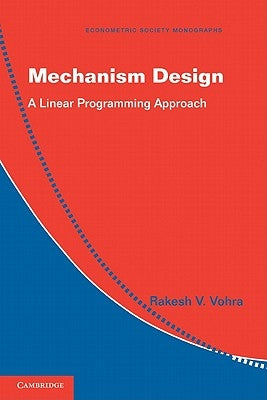1
/
of
1
Cambridge University Press
Mechanism Design: A Linear Programming Approach
Mechanism Design: A Linear Programming Approach
Regular price
$184.36 USD
Regular price
Sale price
$184.36 USD
Shipping calculated at checkout.
Quantity
Couldn't load pickup availability
Mechanism design is an analytical framework for thinking clearly and carefully about what exactly a given institution can achieve when the information necessary to make decisions is dispersed and privately held. This analysis provides an account of the underlying mathematics of mechanism design based on linear programming. Three advantages characterize the approach. The first is simplicity: arguments based on linear programming are both elementary and transparent. The second is unity: the machinery of linear programming provides a way to unify results from disparate areas of mechanism design. The third is reach: the technique offers the ability to solve problems that appear to be beyond solutions offered by traditional methods. No claim is made that the approach advocated should supplant traditional mathematical machinery. Rather, the approach represents an addition to the tools of the economic theorist who proposes to understand economic phenomena through the lens of mechanism design.
Author: Rakesh V. Vohra
Publisher: Cambridge University Press
Published: 05/16/2011
Pages: 184
Binding Type: Hardcover
Weight: 0.84lbs
Size: 9.10h x 6.10w x 0.70d
ISBN: 9781107004368
Author: Rakesh V. Vohra
Publisher: Cambridge University Press
Published: 05/16/2011
Pages: 184
Binding Type: Hardcover
Weight: 0.84lbs
Size: 9.10h x 6.10w x 0.70d
ISBN: 9781107004368
About the Author
Vohra, Rakesh V.: - Rakesh V. Vohra is the John L. and Helen Kellogg Professor of Managerial Economics and Decision Sciences at the Kellogg School of Management, Northwestern University, where he is also Director of the Center for Mathematical Studies in Economics and Management Science. He previously taught at the Fisher School of Business, Ohio State University and is the author of Advanced Mathematical Economics (2005). Professor Vohra has also completed a manuscript on the principles of pricing with Lakshman Krishnamurthi, Professor of Marketing at the Kellogg School. Professor Vohra received his doctorate in mathematics from the University of Maryland.
Share


